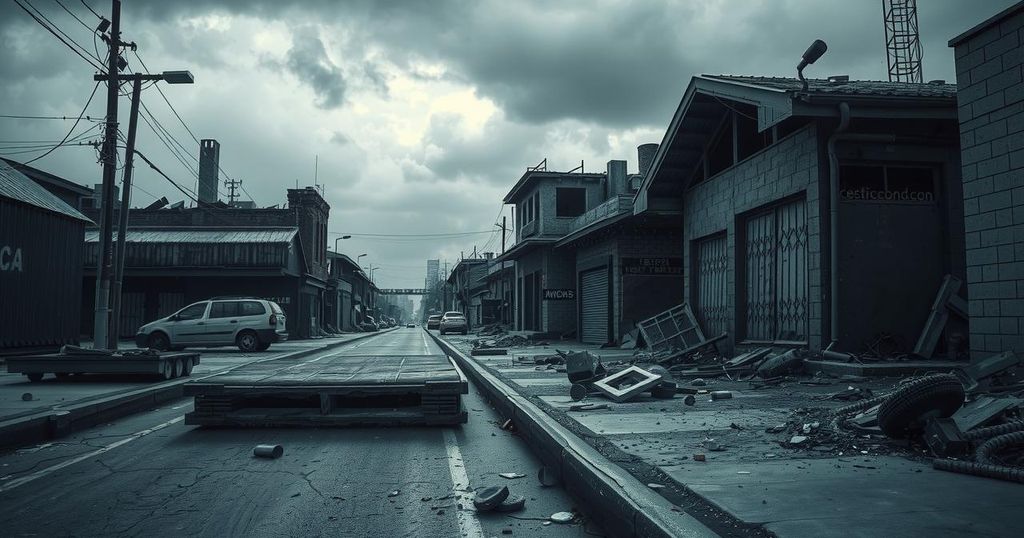World news
AFRICA, BELGIUM, CIVIL WAR, CONGO (KINSHASA), CORN, CORNEILLE NANGAA, DEMOCRACY, DEMOCRATIC REPUBLIC OF CONGO, DRC, EUROPE, FELIX TSHISEKEDI, GOMA, HUMANITARIAN, KINSHASA, KIVU, M23, MILITARY, NBC NEWS, NORTH AMERICA, RWANDA, SOUTH KIVU, TEXAS, TSHISEKEDI, U. S, UNITED NATIONS, UNITED STATES, WAR
Fatima Alavi
0 Comments
Escalating Conflict in the DRC: The M23 Insurgency and Global Implications
The resurgence of the M23 rebel group in the DRC is escalating an already lengthy conflict, causing over 400,000 displacements according to the United Nations. The government claims M23’s actions amount to Rwandan aggression and vows to reclaim lost territory. International responses have been mixed, underscoring the geopolitical implications on regional stability and mineral resource management.
The Democratic Republic of Congo (DRC) is experiencing a significant resurgence of violence as the M23 rebel group attempts to expand its territorial control, notably southward from Goma, a crucial eastern city. This resurgence threatens to escalate the longstanding conflict, with the United Nations expressing grave concerns over regional stability. With over 400,000 individuals displaced last month, the government’s response includes mobilizing against what they perceive as a Rwandan declaration of war. Corneille Nangaa, M23’s leader, has stated intentions to advance towards Kinshasa, DRC’s capital.
The DRC has endured instability since gaining independence from Belgium in 1960. The current conflict has intensified over three years, particularly since January, with numerous clashes leading to civilian casualties and international missions being impacted. The Congolese government denounces M23’s advances as an act of aggression by Rwanda, highlighting severe conditions in Goma where water and power outages exacerbate the humanitarian crisis.
Global reactions to the DRC’s turmoil have been mixed. The rescue of Romanian mercenaries by the U.N. underscores the violent nature of this conflict. Diplomatic visits, such as that of the French Foreign Minister to President Félix Tshisekedi, indicate international acknowledgment while protests against perceived inaction suggest disappointment with the global community’s engagement. Experts warn that the West’s credibility is at stake amidst competing influences from nations like China and Russia.
The M23 rebel group derives its roots from the complex ethnic dynamics post-1994 Rwandan genocide, primarily composed of ethnic Tutsi individuals. While some Tutsi factions integrated into the Congolese army post-conflict, others formed M23, advocating for their community’s rights. Accusations of Rwandan support for M23 complicate the narrative, as they contend that the Congolese government has not adequately protected ethnic Tutsis.
Despite the DRC’s rich mineral resources, including cobalt essential for technology, conflicts have hindered operational security in mining regions. Notably, 80% of cobalt production is controlled by Chinese enterprises. Nonetheless, experts suggest the imminent threat to mineral supply remains low despite rising tensions, as China’s ambassador to the U.N. has noted the potentially widening impact of the insurgency.
Rwanda’s past involvement has shaped the current conflict, with previous military support for M23 leading to international sanctions. While Rwanda has cultivated foreign aid relationships, some Western nations are reconsidering their support amidst escalating violence. The global community’s response continues to evolve, as regional dynamics and international business interests remain at play, complicating the crisis further.
The Democratic Republic of Congo is a nation rich in natural resources, particularly minerals that are vital for modern technology. Since its independence, the country has faced a cycle of conflict, particularly in the eastern regions, where ethnic tensions and the implications of the Rwandan genocide fuel ongoing violence. The recent actions of the M23 rebel group mark a significant uptick in the already fragile stability of the region, prompting international attention.
In conclusion, the resurgence of conflict in the DRC, led by the M23 insurgents, poses significant risks to regional stability and humanitarian conditions. The international community’s response has been characterized by a mix of concern and criticism aimed at inaction, while the complexities of Rwandan involvement and geopolitical interests further complicate the situation. The impact of this conflict may extend beyond the DRC, affecting global mineral supply chains and international relations.
Original Source: www.nbcnews.com




Post Comment